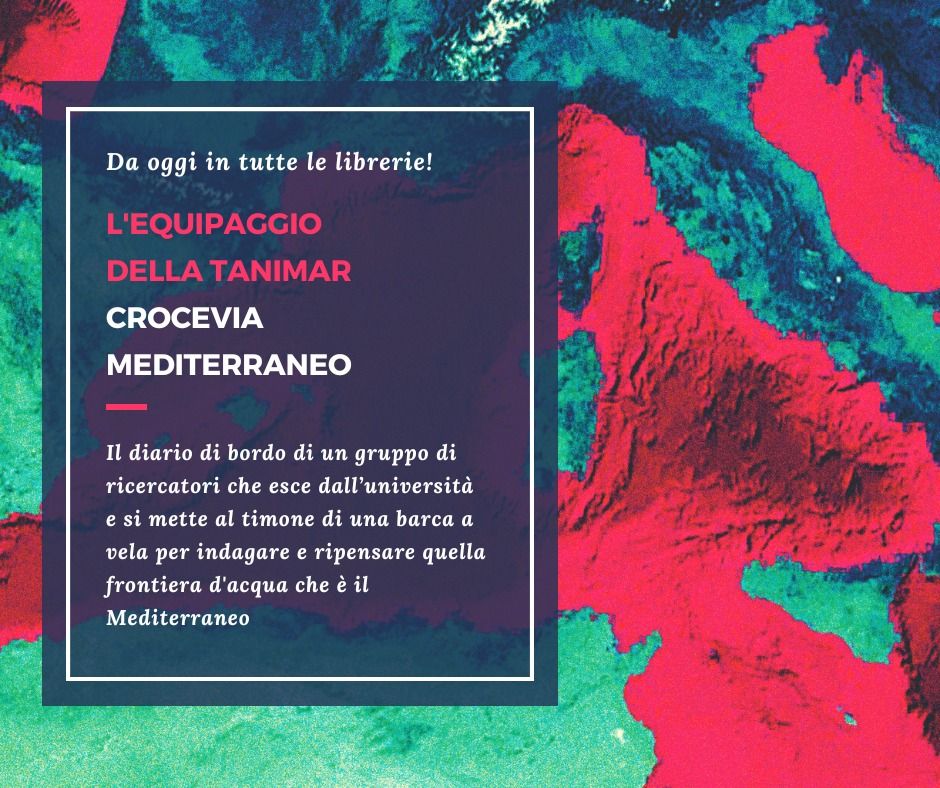News

An ethnographic nautical travel across Tunisia. A new mission with Tanimar
Within the framework of the MOBS research project, onboard of Tanimar, a research unit composed by Jacopo Anderlini (UniPR), Ivan Bonnin (UniGe), Enrico Fravega (UniGE), Dorra Frihi (UniPR), Luca Giliberti (UniPR), Anto Milotta (UniGE), Vincenza Pellegrino (UniPR), Luca Queirolo Palmas (UniGE), will carry out an ethnographic journey along the Tunisian coast, with the aim of studying the transformations of the Mediterranean economy, with particular attention to the fishing and tourism sectors.
Following a similar mission carried out last year in some central Mediterranean islands (Pantelleria, Lampedusa, Linosa and Malta), which has led to the publication of “Crocevia Mediterraneo” (Eleuthera), as well as an ongoing ethnographic work on fishermen of Mazara del Vallo, which took place in July of this year, researchers engaged in this mission will stopover in many Tunisian port, such as Monastir, Madhia, Sfax, Zarzis and the Kerkenna islands, to understand the commonalities and the differences between the processes of social transformation that are affecting the two shores of the Mediterranean Sea.
In this framework, with the aim of developing a sociological perspective that goes beyond the national dimension, facilitating the development of a sociological perpsective capable of embracing the overall transformations of the Mediterranean space, particular attention will be dedicated to the sustainability of fishing activities, to the impacts of climate change and the consequences that these processes deliver on the local communities living on the coast. The mission will start on September 30th and will last at least two weeks.
As part of the same mission, researchers involved will animate the debates at the Sabir Festival, which will be held in the cities of Messina (Italy), from Septembrer 30 to October 1, and Sfax (Tunisia), 9-10 October.

Guglielmo Agolino (UniPR) about the so called “Cutro decree”
On September 24, Repubblica published a long interview to Guglielmo Agolino, Post Doc Research Fellow at the University of Parma, about the modification to the Italian reception system introduced by the so called “Cutro decree”.

New book! “Crocevia Mediterraneo” a cura di Jacopo Anderlini ed Enrico Fravega
May 12 sees the release of “Crocevia Mediterraneo,” a collective logbook by a group of researchers from the Universities of Genoa and Parma involved in an ethnographic voyage into the heart of the Mediterranean Sea.
For the first time, a boat of social scientists sailed the migration routes of the central Mediterranean, making stopovers in the main hubs of European border control: Pantelleria, Lampedusa, Linosa, Malta. An unprecedented logbook that offers us a radically new look at the necropolitic violence of borders and the irreducible drive for mobility.
Dinghies, landings, patrol boats, NGOs, boatmen, etc. Borders spectacularization we have been experiencing in our daily lives, for years, tells only part of the story. The prevailing political-media narratives represent the Mediterranean as a “natural” barrier dividing geographically and socially distant areas. On the contrary, the Mediterranean is – historically – a space of encounter and contamination, as evidenced by this “field” work conducted aboard the Tanimar by a group of social scientists who gave voice and legitimacy to all those who cross it: migrants, fishermen, sailors, coast guards, islanders, and officials of European agencies. A research that by applying the criteria of a sociology understood as public practice proposes to rethink the “water frontier” of the Mediterranean. So that it is no longer a border arbitrarily drawn on the map, but returns to being a common space inhabited by a plurality of social actors who not only constantly call it into question, but are already prefiguring post-national futures capable of transcending state control of mobility.
The book, published by Eleuthera, is edited by Jacopo Anderlini (University of Parma) and Enrico Fravega (University of Genoa) and features contributions by: Guglielmo Agolino, Davide Cangelosi, Arianna Colombo, Luca Daminelli, Emanuela Fracassi, Luca Giliberti, Francesca Goletti, Daniela Leonardi, Antonino Milotta, Luca Queirolo Palmas, Vincenza Pellegrino, Filippo Torre and Veronica Valenti.

Lancio delle cliniche socio-Legali: “migrazioni e frontiere”
Partono il 21 marzo all’Università di Parma le cliniche giuridico-sociologiche “Migrazioni e frontiere”, promosse dall’Ateneo con l’Università di Napoli “L’Orientale” e la collaborazione di Ciac onlus, Croce Rossa Italiana – Comitato di Susa, Diaconia Valdese, Mediterranea, Medici Senza Frontiere e Migrantour Parma.
Le cliniche prevedono una prima fase di formazione propedeutica, con incontri ed esperienze sul campo con operatori e operatrici delle realtà coinvolte,su migrazioni, diritto d’asilo e accoglienza. A seguire, una seconda fase laboratoriale dedicata allo studio dei casi e finalizzata alla produzione di report in costante contatto con i soggetti che collaborano al progetto. Gli incontri saranno sia on-line sia in presenza (nell’Aula III della Sede centrale dell’Ateneo) esaranno apertia studentesse e studenti e a operatori, a volontari e a chiunque sia interessato. La conclusione dei lavori è prevista per fine autunno 2023.
Primo appuntamento martedì 21 marzo alle 14.30 sul tema “Migrazioni: rotte, circolazioni, (im)possibili arrivi”. A seguire martedì 4 aprile alle 14.30 “Mediterraneo, SAR, diritti umani”, martedì 18 aprile alle 14.30 “La criminalizzazione della solidarietà”, martedì 2 maggio alle 14.30 “L’accoglienza oggi” e martedì 9 maggio alle 14.30 su “Technologies at the fringes: unveiling digital infrastructures and information flows”. Martedì 23 maggio incontro con le associazioni coinvolte per progettare la fase operativa della clinica. Al termine dei seminari sono programmati alcuni momenti di esperienza sul campo con operatori e operatrici delle realtà coinvolte, in Val Susa, a Parma e a Napoli.
L’iniziativa è curata da Vincenza Pellegrino , docente del Dipartimento di Giurisprudenza, Studî Politici e Internazionali dell’Università di Parma, e da Adele del Guercio, docente del Dipartimento di Scienze Umane e Sociali dell’Università di Napoli “L’Orientale”.
Coordinamento scientifico: Vincenza Pellegrino (Università di Parma), Adele del Guercio (Università di Napoli “L’Orientale”); Veronica Valenti (Università di Parma); Miguel Angel Mellino (Università di Napoli “L’Orientale”); Guglielmo Agolino (Università di Parma); Jacopo Anderlini (Università di Parma).
Modalità di svolgimento:
in presenza: Aula III Sede centrale Università di Parma
a distanza: https://vado.li/clinicaunipr-unior